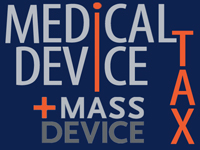
When the Senate voted this month to repeal the medical device tax, they did so in a non-binding manner that was more symbolic than practical, but the move may provide opponents of the tax a new boost in rallying support for repeal.
Senate Minority leader Mitch McConnell (R-Ky.) and former Senator Scott Brown separately called for a "real" vote in the upper house, in part to leverage the momentum of the recent decision, but also to put pressure on the 33 Democrats who cast their votes for repeal when the stakes were low.
"79 members of the United States Senate, including some very liberal Democrats like Elizabeth Warren, actually voted to repeal the medical device tax," McConnell said in a radio interview this week on the Hugh Hewitt program. "When we come back to it on a bill that can actually become law, it’s going to be very difficult for them to explain why they voted to repeal it on one occasion and don’t vote to repeal it on another."
"I think there’s no way you can overstate the significance of that," he added.
Last Thursday, the Senate voted 79-20 in favor of a bipartisan amendment to repeal the medical device tax. The non-binding measure, proposed by Sens. Amy Klobuchar (D-Minn.) and Orrin Hatch (R-Utah), was part of the Senate’s continuing budget resolution.
Repeal efforts have had a hard time gaining traction in the Democrat-led Senate as some members voiced concern about how the government would make up for the $30 billion in revenue the tax is slated to generate over 10 years.
The Klobuchar-Hatch amendment would would establish a deficit-neutral reserve fund to help offset the cost of repealing the tax.
More medical device tax coverage from MassDevice.com.
The measure was largely symbolic in that it was a non-binding amendment, a move that former Senator Brown rejected when he was in office, he told MassDevice.com in an exclusive interview. A vote on a non-binding measure is little more than a token gesture meant to provide cover for lawmakers when they return home in their device-heavy districts, Brown said.
"I know the difference between a fluff vote and a real vote," Brown told us. "It means nothing. When you repeal a tax, you have to go and find another $30 billion – when you can’t even find $85 billion for sequestration. That’s where the tough votes are. If I were in the medical device industry, I would demand that they take the real vote."
It’s unclear whether a true repeal bill would make much headway given that Congress would have to find some means to make up for the $30 billion in revenue the medical device tax would generate. Previous pay-for proposals have rubbed Democrats the wrong way, and President Barack Obama has on more than 1 occasion promised to veto a device tax repeal bill should one land on his desk.
Nevertheless, some opponents of the tax remain optimistic. Sen. Al Franken (D-Minn.) told reporters during a press conference this week that he’s confident that Congress will find a pay-for that everyone can agree on, including President Obama.
Sen. McConnell was less willing to speculate on the outcomes of a potential vote, but he’s eager to see a true medical device repeal bill hit the Senate floor.
"I think if the House sent us a stand-alone medical device tax, it’s going to be really fascinating to see all these liberal Democrats figure out how they’re going to deal with it," McConnell said. "And I think the House now, the Senate having voted the way it did, should send us a bill to do precisely that very soon."

